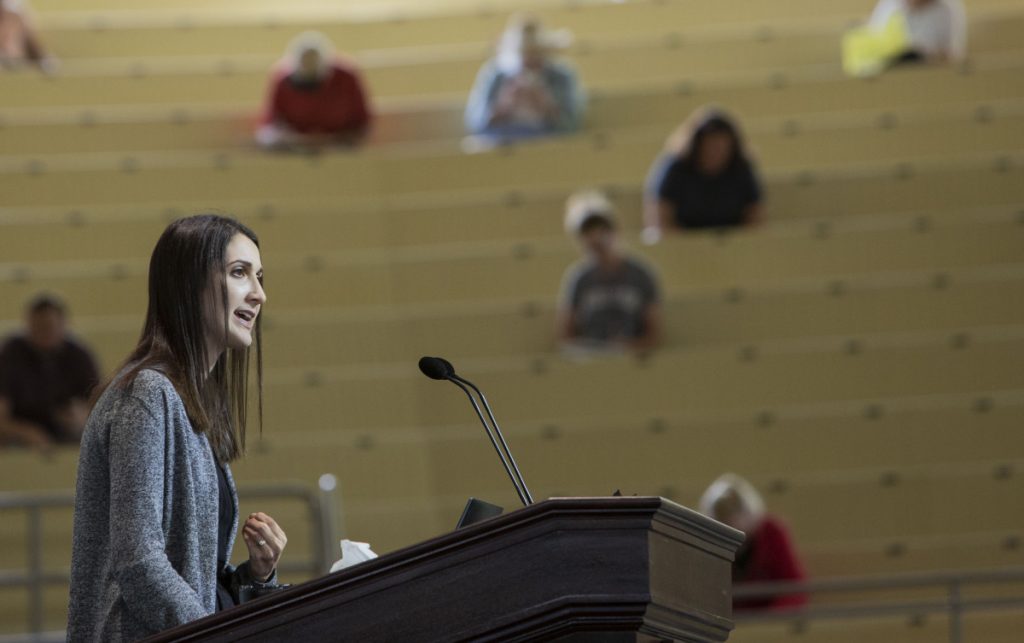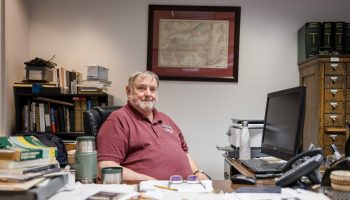In a world facing climate change, a global pandemic, and increasingly frequent school shootings in the United States, among numerous other atrocities, it feels almost impossible to think our world could possibly be moving toward progress. But this idea — that, overall, humanity is deteriorating — is exactly what Chelsea Follett sought to disprove in her 10:45 a.m. lecture Wednesday, July 13, in the Amphitheater.
Follett serves as a policy analyst and managing editor of HumanProgress.org, a project of the Cato Institute, a think tank headquartered in Washington. Her job entails studying human progress through empirical data. Rather than serving as a discouragement, data has become a source of hope.
“Despite all the very real problems that remain, progress is possible. And we know for a fact that it’s possible because the story of humanity up to this point provides evidence of real measurable progress,” Follett said.
This progress can be measured by data.
“Progress is real. You just have to look at the data,” she said. “HumanProgress.org, of which I am managing editor, aims to bridge the gap between mistaken widespread perceptions of hopelessness and the more encouraging reality by making data from reliable third-party sources more widely available.”
Follett pressed Chautauquans to look at more than just headlines when deciding on the state of the world. While we do live in a world filled with sorrow, she said there are areas of improvement.
Before she discussed the main points of her lecture, she urged the audience to remember: “Progress is not only definable, but also measurable.”
The first example of such measurable progress that Follett shared was material progress, which influences quality of life.
“It plays a critical role in our quality of life today, but also because I would argue it actually undergirds and enables much of the moral progress that humanity has made,” she said. “Destitution was once the universal form.”
Article 25 of the Declaration of Human Rights says that everyone has a right to a standard of living that upholds their health and well-being. This includes food, housing, health care, clothing, social services and security in “the event of unemployment, sickness, disability, widowhood, old age, or other lack of livelihood and circumstances beyond (their) control.”
The notion that all of these resources are seen as human rights is a recent development, and it’s one that Follett thinks would astound our ancestors.
“Life was a constant struggle for survival, for the bare necessities needed just to get by,” she said.
Humans were accustomed to foraging, and then subsistence agriculture. An abundance of wealth and resources used to be available to a very select few.
“Before the year 1900, more than 90% of people on the planet lived in what is today classified as extreme poverty, and then everything changed,” she said. “Human economic history resembles a hockey stick with a long straight shaft and an upward facing blade. For millennia upon millennia, economic growth was negligible, resembling that long, straight shaft, and at the end of the 18th century, economic growth and, consequently, the standard of living started to accelerate … resembling that upward facing blade.”
To support this theory, Follett pointed to the tremendous increase of the gross domestic product of numerous European countries. A few reasons exist as to why the GDP exploded. Regardless if it was caused by the end the British empire, which increased competition, or by a shift in the approach to wealth creation, the change occurred.
The second area of progress Follett shared was life expectancy. When Theodore Roosevelt was alive, the average life expectancy in the United States was 50 years.
“Today, global life expectancy is around 70 years,” Follett said.
She acknowledged the COVID-19 pandemic has caused a decrease in life expectancy, but pandemics or epidemics are not new to the human experience, she said in reference to the 1918 Spanish Flu and the Bubonic Plague.
“Humanity has never been better prepared scientifically and technologically to deal with a pandemic than now. By building on previous market tests and knowledge, we create and benefit from new inventions, like mRNA vaccines; the pace of medical progress is faster than ever,” Follett said.
From the emergence of polio in ancient Egypt, Follett said, it took around 3,500 years to create a vaccine. The COVID-19 vaccine was available in spring 2021 after the virus first emerged in late 2019.
The speed at which the vaccine was created is not the only improvement Follett sees — just believing diseases are curable is an improvement from what humans believed even a few hundred years ago.

“During the Bubonic Plague pandemic in the Middle Ages, many assumed that it was a divine punishment for humanity’s sins that should simply be accepted,” Follett said. “And some of the brightest minds of the day at the University of Paris, when commissioned by the King of France to explain the plague, concluded that the movements of Saturn were to blame. Others claimed witchcraft. It never occurred to them that, through the use of reason, an entire illness, or set of illnesses, could be defeated forever and relegated to the pages of history, as we did to smallpox, for example.”
Advancements have alleviated the effects of other medical challenges, too. Rates of cancer are declining, as are infant mortality rates, which Follett finds especially hopeful as a mother.
She touched briefly on progress in education.
“In 1950, the average American attended school for about nine years. Today, globally, the average person attends school for over nine years,” she said.
The third and final area of progress she discussed was moral progress, which includes an increase in rights for people with disabilities, women, people in the LGBTQ+ community and people of color.
“Two hundred years ago, slavery was not only widespread, but almost universally accepted as just and natural. Opposition to slavery was once a radical position. Slavery is now illegal in every country,” she said.
Since the start of the women’s rights movement, women have gained the right to legally vote in national elections in every democratic country.
She acknowledged that while people in the LGBTQ+ community do not have the right to marry someone of the same sex in every country, 30 countries do recognize same-sex marriage, “with the most recent being Chile, starting in March of this year, and Switzerland starting this month.”
Interracial marriage, as well as marriage between people of different religions, is also progressing — the former was illegal in the United States until 1967.
“The long-term trends in moral progress are undeniable, just as with material progress,” Follett said. “Again, that is not to say that moral progress is inevitable; far from it. Or steady, because it isn’t. But moral progress is just as real. Unfortunately, there is often a wide gap between the reality of human experience, which is characterized by incremental improvements and public perceptions, which tends to be focused on unusual, dramatic events, rather than long-term trends, leading to discouragement.”
Follett encouraged the audience to appreciate the social changes that have occurred, but to recognize that our world is by no means a utopia, and cruelty still occurs.
“A recent study found that in the extreme poverty of rural Tanzania, after a poor harvest, women are frequently blamed and murdered for witchcraft,” she said.
During years where unusual amounts of rain kill crops and create opportunities for famine, those killings double, Follett said, with the poorest families more likely to participate in the murders.
“Village mobs and individual families strangle, burn alive, knife or beat to death thousands of alleged witches each year,” Follett said.
When similar killings were more common in 17th-century Western Europe, the average income in Germany was comparable to that of Tanzania in 2022, she said.
“In conditions of extreme poverty, superstitions often thrive,” Follett said.
Often, people commit atrocities against others in the name of the community, or even in the name of human rights. Follett gave the examples of Nazis committing genocide to move toward a more “perfect” human species or current Russian President Vladimir Putin, “(invoking) the language of human rights and freedoms to justify all sorts of actions.”
It is difficult, she noted, to be hopeful about human rights when so many countries that violate human rights have a seat at councils like the United Nations, which has articles declaring what universal human rights are.
“So how do idealistic people avoid becoming party to wrongdoing? First, we must hold human dignity and freedom inviolable, sacred as a line not to be crossed in pursuit of a better world, no matter how noble the end goal,” Follett said.
She said we must stand up for our convictions while, at the same time, acknowledging new evidence.
“Following the data and recognizing that just as we now look on many long-in-question practices of the past as abhorrent, in the future, it is possible that our descendants will look back at all of us in abject horror and judge practices of today as nightmare-ish,” Follett said. “Not just the atrocities that we also recognize as wrong, but perhaps even practices that we accept.”
We should hope for this, Follett said, because it “implies a continued expansion of the circle of empathy and of the further advancement of moral progress.”
Understanding that humans are fallible is crucial to moving toward progress.
“The way to maintain that humility is through openness, not just as a personal disposition, but as a social reality,” Follett said.
She paraphrased 20th-century Austrian-British philosopher Karl Popper:
“Only in an open society, in a proximate society which tolerates and respects many views and many opinions, can we hope to learn from our mistakes and so get nearer to the truth.”
These ideas of openness, freedom and humility drive the possibility of change, both for human rights and for human progress. Change must be sought, Follett said, because it is not something that happens naturally without people fighting for it.
“Progress is not guaranteed,” Follett said.
She shared that the goal should be to look into the past to see what conditions have contributed to humanity’s growth and then work to apply those conditions to the present.
“And that is precisely why gatherings like this are so important and why Chautauqua’s mission of lifelong learning is so critical, because with humility and the freedom to debate, experiment, and exchange, we improve humanity’s odds of continued material and moral progress.”





